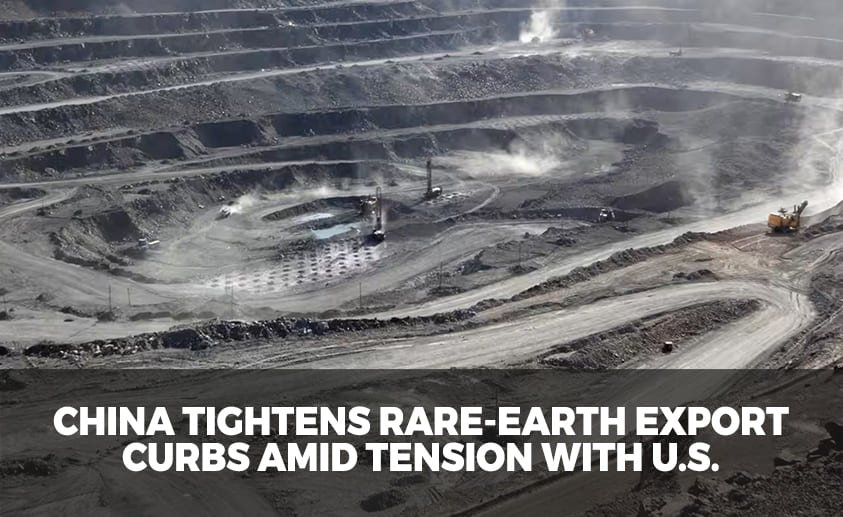China's Rare Earth Export Curbs Hamper Tesla's Optimus Robot Development

Table of Contents
The Critical Role of Rare Earths in Robotics
Rare earth elements are indispensable for the functionality of many modern technologies, and the Tesla Optimus robot is no exception. Their unique magnetic and electrical properties are crucial for achieving the precision and power required in advanced robotics.
Rare Earth Elements in Optimus Robot Components
The Optimus robot, like most advanced robots, utilizes several rare earth elements in its critical components. Specifically:
- Neodymium (Nd): A key ingredient in powerful and compact permanent magnets used in the robot's actuators and motors. These magnets enable the precise and strong movements necessary for complex tasks. Without neodymium magnets, the robot's motors would be significantly less powerful and efficient.
- Dysprosium (Dy): This element enhances the performance of neodymium magnets, particularly at high temperatures. This is critical for maintaining the robot's functionality during sustained operation, preventing performance degradation under stress.
- Other Rare Earths: Additional rare earth elements may be present in sensors, control systems, and other components, further highlighting the widespread reliance on these materials.
The performance of these components directly impacts the robot’s capabilities. The strength, precision, and efficiency of the motors and actuators are all directly linked to the quality and quantity of rare earth elements used. Currently, there are no readily available and cost-effective substitutes that can replicate the unique properties of these rare earths.
Global Rare Earth Dominance of China
China's control over the rare earth market is a dominant factor in this equation. China holds an overwhelming share of global rare earth mining and processing, controlling an estimated 70-80% of global production. This dominance gives China significant leverage in the global market, influencing prices and availability. The geopolitical implications are significant, creating potential vulnerabilities for countries and companies heavily reliant on these materials.
Supply Chain Disruptions and Potential Shortages
China's export restrictions and quotas on rare earth elements directly impact Tesla's ability to source the materials needed for Optimus production. This poses a risk of:
- Production Delays: Insufficient rare earth supplies could halt or significantly slow down Optimus robot manufacturing.
- Increased Costs: Competition for limited rare earth resources could drive up prices, increasing the cost of producing each robot.
- Compromised Performance: Potential reliance on lower-quality or less efficient substitutes could compromise the performance and reliability of the Optimus robot.
Tesla is exploring alternative sourcing strategies, including potentially working with companies in other countries that are developing their rare earth capabilities, but these efforts will take time and may not fully mitigate the risks posed by China's export curbs.
Tesla's Response to Rare Earth Export Curbs
Facing these challenges, Tesla is likely pursuing a multi-pronged approach to mitigate the impact of rare earth export curbs.
Diversification Strategies
Tesla is actively seeking to diversify its supply chain for rare earth elements. This may involve:
- Developing relationships with miners and processors in other countries: This includes countries in Australia, the US, and potentially in Africa, although each presents its own unique challenges.
- Investing in rare earth mining and processing facilities: This would give Tesla greater control over its supply chain, but represents a large capital investment with significant risks.
- Securing long-term contracts with existing suppliers: This strategy aims to guarantee a stable supply of rare earth materials, even if it doesn't necessarily address the risk of price increases.
The feasibility of these strategies depends on the speed at which alternative sources can be developed and the economic viability of such ventures.
Technological Innovation and Substitution
Tesla is likely investing heavily in research and development to reduce its dependence on rare earth elements. This could involve:
- Developing alternative magnet technologies: Research into using less reliant materials or different magnet designs is essential.
- Optimizing robot design: Reducing the overall need for rare earth-based components through innovative design changes.
- Exploring alternative materials: Investigation of other materials that can perform similar functions with reduced reliance on rare earths.
The success of these efforts will determine whether Tesla can maintain Optimus development momentum while navigating the challenges of China’s rare earth policies.
Lobbying and Political Influence
Tesla, like other multinational companies facing similar supply chain challenges, may be engaged in lobbying efforts to influence trade policies. This could include:
- Advocating for fair trade practices and reduced export restrictions: This could involve working through industry associations or directly engaging with governments.
- Supporting policies that encourage the development of domestic rare earth industries in other countries: This could potentially create a more diversified and resilient supply chain.
- Negotiating bilateral agreements to secure stable rare earth supplies: Direct engagement with exporting countries could provide a solution, but is dependent on geopolitical dynamics.
Navigating the complexities of international trade regulations requires a deft touch and requires strong relationships with policymakers.
The Broader Implications for the Robotics Industry
The impact of China's rare earth policies extends far beyond Tesla's Optimus project.
Impact on Global Robotics Development
China’s dominance of the rare earth market creates significant challenges for the global robotics industry:
- Increased Costs: Higher rare earth prices make robotics development and manufacturing more expensive.
- Slower Innovation: Supply chain uncertainties can stifle innovation and investment in the sector.
- Uneven Playing Field: Larger companies with more resources are better positioned to navigate these challenges, potentially exacerbating existing inequalities within the robotics industry.
Smaller robotics companies are particularly vulnerable, potentially hindering their ability to compete with larger, better-resourced players.
Geopolitical Tensions and Trade Wars
The dependence on rare earth elements for critical technologies has heightened geopolitical tensions:
- Resource Nationalism: Countries with rare earth resources might adopt protectionist policies to secure their national interests.
- Trade Disputes: Rare earth scarcity could trigger trade disputes and friction between countries.
- New Alliances: Countries might form new trade alliances to ensure access to these vital resources.
The future of international relations and trade agreements will be significantly affected by how this dependence on rare earth materials is addressed.
Conclusion
China's rare earth export curbs pose a significant challenge to Tesla's Optimus robot development and the wider robotics industry. The dependence on these crucial materials highlights the need for diversification strategies, technological innovation, and proactive engagement with geopolitical realities. Tesla, and the robotics industry as a whole, must address these challenges to ensure the continued progress and accessibility of advanced robotics. The future of humanoid robots hinges on finding solutions to navigate the complexities of rare earth export curbs and securing stable supply chains. Continued research into alternative materials and technologies is critical to mitigating the impact of China's rare earth dominance on the Tesla Optimus Robot and the future of robotics development.

Featured Posts
-
 Chinas Energy Strategy Diversifying Lpg Sources Away From Us Tariffs
Apr 24, 2025
Chinas Energy Strategy Diversifying Lpg Sources Away From Us Tariffs
Apr 24, 2025 -
 Alcons 417 5 Million Acquisition Of Village Roadshow Approved
Apr 24, 2025
Alcons 417 5 Million Acquisition Of Village Roadshow Approved
Apr 24, 2025 -
 Guilty Plea Lab Owner Falsified Covid 19 Test Results
Apr 24, 2025
Guilty Plea Lab Owner Falsified Covid 19 Test Results
Apr 24, 2025 -
 Brett Goldstein On Ted Lasso Season 3 A Comeback From The Brink
Apr 24, 2025
Brett Goldstein On Ted Lasso Season 3 A Comeback From The Brink
Apr 24, 2025 -
 Luxury Car Sales In China Analyzing The Challenges Faced By Bmw And Porsche
Apr 24, 2025
Luxury Car Sales In China Analyzing The Challenges Faced By Bmw And Porsche
Apr 24, 2025
